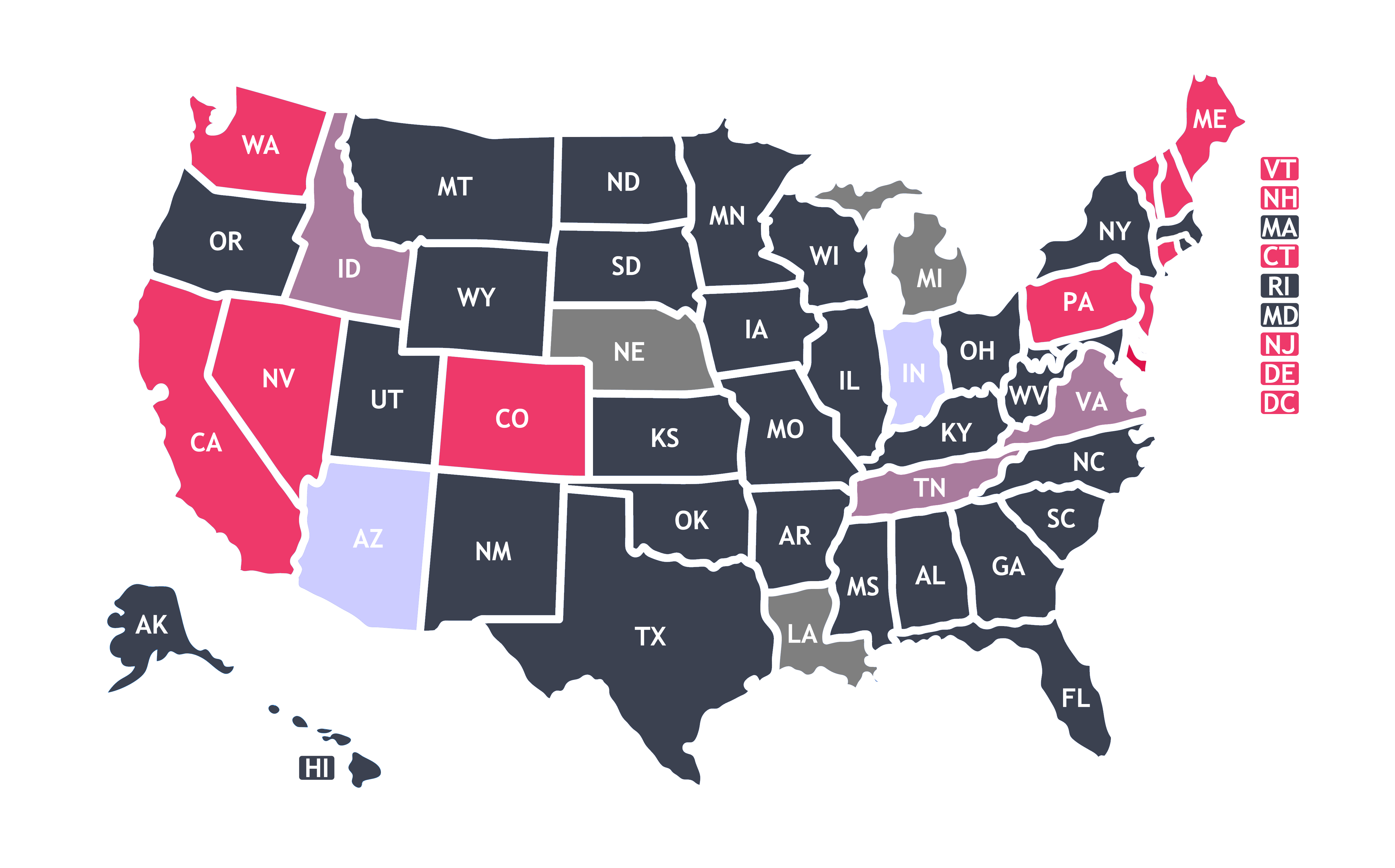States guide map
The regulation regarding surrogacy, whether by statute or jurisprudence, is constantly evolving.
In the United States, laws differ from state to state and sometimes even vary from county to county.
This map is being updated, so it does not constitute legal advice and should not be relied upon as such. The information contained herein is for informational purposes only.
To obtain more information about the individual states, open the corresponding page by clicking on the map or contact us: [email protected]

California
Surrogacy is allowed even in the case of international parents, i.e., non-U.S. citizens.
Parentage is granted with a Pre-birth Parentage Order that becomes valid at the birth of the child, according to California Family Code Section 7633
Both intended parents, even in the absence of genetic material, are declared the legal parents of the child and are granted birth certificates bearing their names
In caso di coppie omogenitoriali, si applicherà la stessa disciplina.
Nevada
La pratica è consentita anche in caso di genitori internazionali, ovvero cittadini non americani e filiazione viene dichiarata con Pre-birth Parentage Order
Both intended parents, even in the absence of genetic material, are declared the legal parents of the child and are granted birth certificates bearing their names
In caso di coppie omogenitoriali (anche internazionali), si applicherà la stessa disciplina
Colorado
Washington
As of 2019, new legislation is in effect which provides legal protection for gestational surrogate agreements. The new parentage statute is RCW 26.26A
Pre-birth Parentage Order is now granted but enforceability remains suspended until the birth of the child
Both intended parents, even in the absence of genetic material, are declared the legal parents of the child and are granted birth certificates bearing their names
In the case of homosexual couples (including international ones), the same rules are presumed to apply (concrete jurisprudence on this is currently lacking)
Pennsylvania
Maine
Maine
Vermont
New Hampshire
Connecticut
New Jersey
Delaware
Vermont
New Hampshire
Massachussets
Connecticut
Rhode Island
Maryland
New Jersey
Delaware
District of Columbia
The practice is allowed and parentage is declared with Pre-birth Parentage Order
In the absence of genetic material, it is up to the court whether or not to grant parentage with the Parentage Order
Both intended parents are declared legal parents of the child and obtain birth certificates bearing their names
In the case of homosexual couples (including international ones), the same protocol applies but caution must be exercised
Oregon
The practice is allowed and parentage is declared with Pre-birth Parentage Order
In the absence of genetic material, it is up to the court whether or not to grant parentage with the Parentage Order
Both intended parents are declared legal parents of the child and obtain birth certificates bearing their names
In the case of homosexual couples (including international ones), the same protocol applies but caution must be exercised
Idaho
Utah
Arizona
Montana
Wyoming
New Mexico
North Dakota
South Dakota
Nebraska
Kansas
Oklahoma
Texas
Iowa
Mississippi
Minnesota
Missouri
Arkansas
Alabama
Louisiana
Florida
Gestational Surrogacy is regulated by statute (Ch.742.15 FL Stat.).
The different phases leading to parentage vary depending on whether the intended parents are a married couple (same-sex or heterosexual), single, or are genetically related to the child.
Unlike other states, under certain conditions both pre-birth and post-birth parentage orders can be requested from the intended parents.
Florida also allows traditional surrogacy, where gestation is carried out by the surrogate mother who shares a genetic connection with the child.

